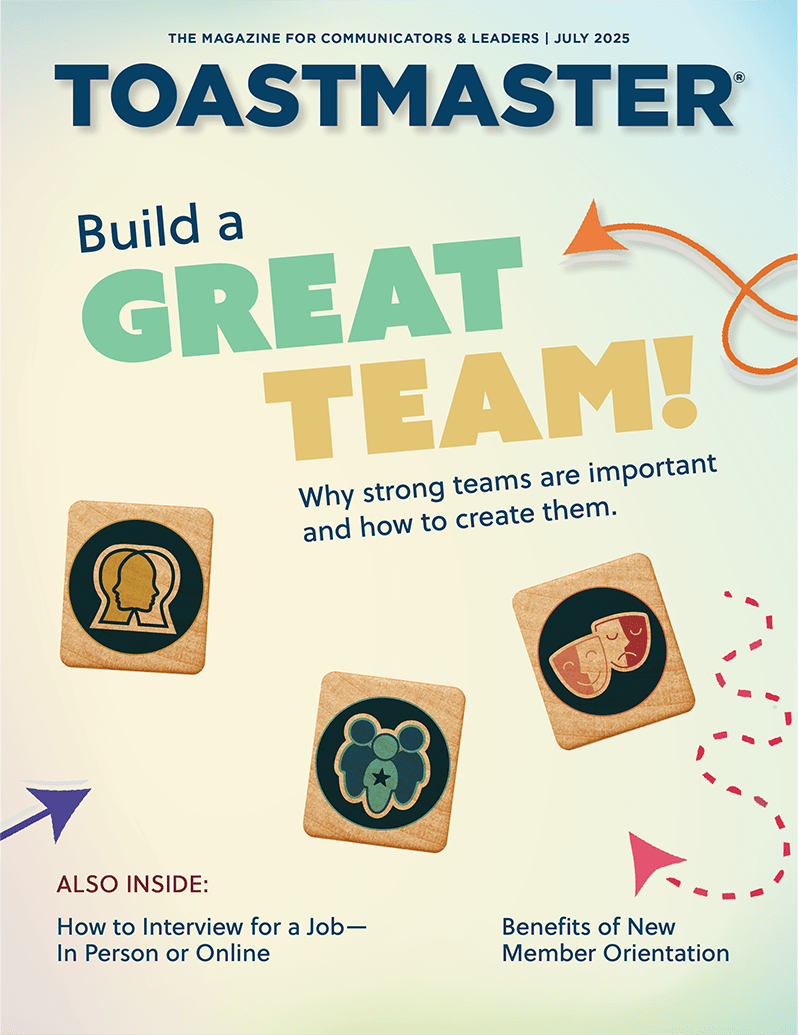
One of the many benefits of being a Toastmaster is the opportunity to be part of a team. In fact, teamwork is at the heart of the Toastmasters experience, with leadership teams at the club, Area, Division, District, and region levels. If you’ve ever been part of a high-performing group, you know how confident and capable it makes you feel. And if you’ve been on a not-so-stellar team, you know how disheartening and discouraging it can be.
Throughout my life, I’ve had the privilege of being a member of extraordinary teams. From my days as a student-athlete in college to my time working as a human relations specialist at Fortune 500 companies, I’ve spent more than 25 years studying how great teams make individuals stronger.
Teams exist because certain challenges or opportunities are too big for one person to handle alone. The good news is that skills and techniques demonstrated by a highly successful group can be learned. I’ve rounded up five essential components of extraordinary teams. I call them the “5 C’s.”
1 Thriving teams are composed of competitors.
Being a competitor doesn’t mean you want to be better than everyone else, and it doesn’t mean you have to be the best; it simply means you want to be your best. As a Toastmasters team leader, inspire your teammates to give their best at every meeting. Resist the urge to compare your club to another club or your District to another District.
Competitors have a passion for what they’re doing. As a leader, find out what members of your team are passionate about. Often what seems like a lack of motivation or buy-in from someone is simply a disconnect between what’s important to them as an individual and what’s important to the organization. Without passion (or at least an interest in the topic), people quit, especially when things get monotonous or boring. You want people who care about the outcome.
2 They have a common goal.
On great teams, everyone melds their talents, experience, and passion to achieve a common goal. And to achieve that goal, every team member must be willing to make a sacrifice on some level at some time. To make sure everyone stays focused on that common objective, even when disagreements emerge, look to your Club Success Plan and the Toastmasters core values: integrity, respect, service, and excellence.
Ask team members to make sacrifices when it’s best for the team and be willing to make them yourself. Sacrifice doesn’t have to mean taking on more yourself or giving something up—it might be doing something differently. Often we do something a certain way because that’s the way we’ve always done it. But we need to question why. Why are we doing it this way? Is there a better way or new ideas from younger or newer members that could help us do things better or cheaper?
Adversity and discomfort are the birthplace for creativity and solutions; that’s often when people are the most innovative, creative, and thoughtful.
And if your team does make a bad decision, don’t point fingers or sweep things under the rug. Take time to analyze—talk to people, conduct a survey, review what happened. Mistakes are always learning opportunities, both for your team and for individuals.
3 They communicate, communicate, communicate.
Teams need to have open and honest communication; it’s the only way to build trust. It doesn’t matter how many talented, passionate individuals you’ve amassed or recruited—if there is no trust, there is no team. People won’t extend themselves or go the extra mile for people they don’t know and therefore don’t trust.
So how can you build that trust? Early in the program year, get together outside of your normal structure or routine. Grab breakfast or a cup of coffee, or meet for lunch. You just want to experience a different environment in a different context and get to know people outside of their club role. Leaders need to make a concerted effort to reach out and build healthier relationships, because ultimately that will lead to more open and honest conversations. If you have to tiptoe around feelings or you’re suspicious of motives, it’s a lot harder to work together.
Gaining trust and opening the lines of communication also illuminate the range of perspectives on a team. Sometimes what appears to be disagreement is more a matter of people looking at an issue from different perspectives. As a leader, you have to be open to all points of view, not just the ones you agree with. Communication is about listening, not just talking.
The top reason people leave their jobs (or their clubs or their relationships) is they don’t feel valued, appreciated, or heard. Even if a team is wildly successful, if people don’t feel valued, appreciated, or heard, they’ll be unhappy. Cultivate trust and respect from the beginning, so that members feel they can communicate openly without repercussions.
4 They have chemistry.
At its most basic definition, chemistry is about how atoms and elements act and react with one another—it’s about the bonds that form. Most bonds are formed under heat and pressure. The same is true of teams: The stuff that tears some groups apart is the same thing that brings extraordinary teams together.
Heat and pressure are part of life and part of being on a team, and when times get tough, leaders have an opportunity to rally their team and approach challenges as opportunities. Adversity and discomfort are the birthplace for creativity and solutions, and that’s often when people are the most innovative, creative, and thoughtful. If you’ve opened the lines of communication, and you have a team that trusts each other, you should be able to work with them, ask for help, and admit you don’t know everything.
Leadership teams can use difficult or uncomfortable situations to grow stronger and better. When things get uncomfortable, rather than ask, “How am I going to get out of this?” try shifting the perspective and ask, “What can I get out of this?” It’s the same situation, the same pain and discomfort, but now you’re leveraging the pain to get better, to learn something, to grow.
5 They are consistent.
You should strive for your best possible meeting each time. Think about a guest coming to a club meeting. If they go once and it’s just okay, maybe they’ll go again, and if it’s still just okay, they probably won’t go back. But if it’s a good experience, people will join, they’ll tell their friends, they’ll want to be more active.
That said, it’s important that leaders decide what is critical to a successful meeting. Many leaders want to check 35 things off the list, but it’s impossible to focus on a wide range of priorities, so think about your must-haves for every meeting. Determine the top priorities—a personal greeter, a clear agenda, new member packets, etc. That way, if something slips, it won’t be one of these things.
Aristotle said we are what we repeatedly do. Excellence is not an act (you can’t be good periodically), it’s a habit. You can’t have 467 priorities and master all of them; for consistency and excellence, you have to focus on a few and practice them with a level of excellence to build machine-like consistency.
Take a look at the Toastmasters team you’re on. Is it composed of competitors? Does it have a common goal? Do members communicate constantly? Do they have chemistry? Are they consistent in striving for excellence? If the answer is no to any of these questions, ask yourself what you can do to build a stronger team.
Lee Rubin is a professional speaker at corporations and conferences throughout the U.S. He has 15 years’ experience as a human resource professional with Fortune 500 companies. This article is excerpted from his education session at the 2019 Toastmasters International Convention. Learn more at www.leerubinspeaks.com.




 Previous Article
Previous Article

